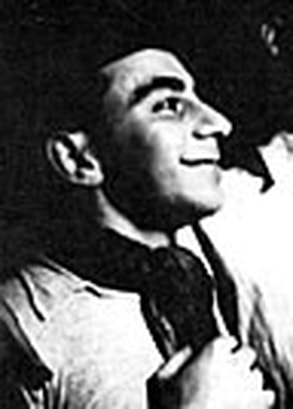Track of the Month: february 2021

In honor of Black History Month, here is "Why Does the Black Man Sit at the Back of the Car?" by Terezín composer Karen Svenk. The piece is a protest against racial inequality, an inspiring show of solidarity from a composer imprisoned in a concentration camp half a world away.
The music you hear—arranged by composer David Post and performed by the Hawthorne String Quartet with Thomas Martin, clarinet—has an interesting history. It is one of the Svenk cabaret tunes survivor George Horner performed on piano accordion in Terezín. These tunes survived the war only in George's memory. TMF Executive Director Mark Ludwig had the great pleasure of knowing George, and over the course of several years convinced him to notate this music and perform it in public. The first performance was in the Ludwig family living room, more than sixty years after George first played these tunes as a Terezín prisoner. The second performance came few years later, when George, at the age of ninety, debuted them at Boston's Symphony Hall with Yo-Yo Ma (see the video below). It brought down the house and made international news.
Karel Svenk, born in Prague in 1917, was a cabaret artist, comedian, songwriter, and writer. He became a leading figure in Terezin's cultural life and is best remembered for his secret camp anthem, the "Terezin March." He also composed cabaret revues, including the satire "The Last Cyclist," censored by the Nazis. Svenk was sent to Auschwitz and then Meuselwitz, a subcamp of Buchenwald. He died on a death march from Kraslice to Mauthausen in April 1945.
More music by Karel Svenk and other Terezin composers is here.
The music you hear—arranged by composer David Post and performed by the Hawthorne String Quartet with Thomas Martin, clarinet—has an interesting history. It is one of the Svenk cabaret tunes survivor George Horner performed on piano accordion in Terezín. These tunes survived the war only in George's memory. TMF Executive Director Mark Ludwig had the great pleasure of knowing George, and over the course of several years convinced him to notate this music and perform it in public. The first performance was in the Ludwig family living room, more than sixty years after George first played these tunes as a Terezín prisoner. The second performance came few years later, when George, at the age of ninety, debuted them at Boston's Symphony Hall with Yo-Yo Ma (see the video below). It brought down the house and made international news.
Karel Svenk, born in Prague in 1917, was a cabaret artist, comedian, songwriter, and writer. He became a leading figure in Terezin's cultural life and is best remembered for his secret camp anthem, the "Terezin March." He also composed cabaret revues, including the satire "The Last Cyclist," censored by the Nazis. Svenk was sent to Auschwitz and then Meuselwitz, a subcamp of Buchenwald. He died on a death march from Kraslice to Mauthausen in April 1945.
More music by Karel Svenk and other Terezin composers is here.
MORE MUSIC FROM KAREL SVENK
This short film features Svenk's Lullaby from "Long Live Life," performed by survivor George Horner and Yo-Yo Ma at our 2013 Symphony Hall gala.
|
|
